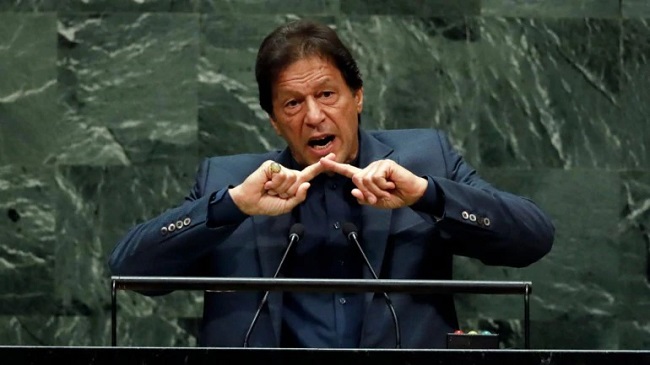
Now that annual Indo-Pak war of words at the UNGA (United Nations General Assembly) is over and each side is claiming to have outdone the other, it’s time to analyse as to who really ‘won’ and who actually ‘lost’. Both sides entered into the arena with handicaps; in Indian PM Narendra Modi’s case it was imposition of restrictions in Kashmir after abrogation Art 370 and Art 35A of the Constitution while for Pakistan PM Imran Khan it was the international terror financing watchdog Financial Action Task Force (FATF) putting Pakistan on its ‘grey-list’.
But while Modi kept his cards close to his chest, Khan went to town boasting of how he would “forcefully present the Kashmir issue like never before.” The result was that while the Indian media could only speculate on what Modi was likely to say in his UNGA address, Pakistan media hyped Khan’s statement as a defining moment in the country’s history. Pakistan’s Representative to the United Nations Maleeha Lodi went a step further to declare that for PM Khan and Pakistan, the 74th UNGA meet was “Mission Kashmir.”
That Khan had bitten off more than he could chew became apparent even before he was scheduled to deliver his “like never before” address on the issue of Kashmir when he told the media in advance that he wasn’t optimistic of accomplishing anything by his speech at the UN. To add to his woes, while Modi who preceded him pitched strongly for coordinated global efforts against terrorism, but by making no reference whatsoever to Pakistan, he denied Khan the opportunity to use Modi’s Pakistan-bashing to build his Kashmir narrative of justifying terrorism by calling it a ‘freedom struggle’.
Yet, instead of modifying the tone and tenor of his speech to counter Modi’s effective use of the indirect suggestion technique, Khan relied on the ‘buckshot approach’ of firing a salvo of unproven allegations in the hope that at least an odd one would find its mark! What followed was a litany of accusations that ranged from the pedestrian to the absurd. By presenting Modi as a person “blinded by arrogance” who being a “life-member” of an organisation that is “inspired by Hitler and Mussolini” and “believes in the racial superiority of Hindus” with intense “hatred for the Muslims and Christians,” Khan tried to portray the Art 370 abrogation decision as the deed of an evil and racist mind.
Going on to give a communal colour to the Kashmir issue, Khan went on to lament how “…The phrase Islamic terrorism allows India to dismiss human rights and further increase cruelty on the people of Kashmir.” Predicting that Kashmir will witness a “bloodbath,” he proceeded to embellish the communal angle with a global dimension by saying that all Muslims were watching that “this (atrocity) is only happening to Kashmiri Muslims.” He also tried to set the cat among the pigeons by claiming that the present developments in Kashmir will “radicalise” the 1.3 billion strong Muslim community the world over!
By likening the international community’s silence on Kashmir to “appeasement (of Nazi Germany) like that in 1939 in Munich,” Khan stepped into the realm of the absurd. But he didn’t stop here but instead went to openly accuse the international community of being unconcerned about the sufferings of Kashmiris just because they happened to be Muslims, conveniently forgetting that the international community had displayed a similar attitude when Kashmiri Pandits were driven out of Kashmir by JKLF (Jammu Kashmir Liberation Front) and Hizbul Mujahideen terrorists in 1990. Turning into a prophet of doom, Khan proceeded to warn the world that if UN didn’t intervene, then Kashmir would become the flashpoint for a conventional Indo-Pak conflict, which would inevitably culminate in a nuclear exchange since Pakistan would fight to the end!
Imran Khan had started making noise immediately after New Delhi abrogated Art 370 and had anointing himself as the “Kashmir’s ambassador.” He promised to raise the Kashmir issue at every international forum including the UN. In contrast, Modi’s silence was conspicuous. But even as Islamabad’s perfunctory diplomatic offensive to isolate New Delhi on the issue of Art 370 abrogation failed to make any headway at both the OIC (Organisation of Islamic Cooperation) and UNSC (United Nations Security Council), New Delhi’s diplomatic outreach sans any flourish triumphed. The very fact that save China, Turkey and Malaysia, no other country stood by Islamabad sums up as to who won and who lost at the UNGA!
Tailpiece
Pakistani media went overboard by heaping praises on Khan for his UNGA address and the people there are celebrating what they have been told is a spectacular victory. But related developments don’t seem to suggest so. Foreign Minister Shah Mehmood Qureshi lauded Ms. Maleeha Lodhi by saying that she “served Pakistan with distinction and commitment and organised the prime minister’s successful UNGA visit with skill and dedication.” However, if this is really true, then what explains her abrupt sacking just two days after the UNGA session? Furthermore, if Khan’s UNGA visit was really successful, then why did he on returning home tell the people that “Whether the world stands with Kashmiris or not, Pakistan is standing by them”?
With such a pessimistic note coming from the horse’s mouth, isn’t it amply clear as to was the winner at UNGA?
